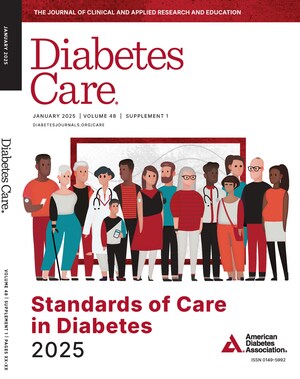Data Demonstrates Once Weekly Drug as Potential Solution for Patients with Type 2 Diabetes, Obesity and Fatty Liver Disease
SAN DIEGO, June 26, 2023 /PRNewswire/ -- Today, findings from two phase 2 clinical trials showcase new data for an investigational, once-weekly injectable glucose-dependent insulinotropic polypeptide (GIP)/ glucagon-like peptide 1 (GLP-1)/glucagon (GCG) receptor agonist, retatrutide. One study was conducted in people with obesity and included a substudy in patients who also had non-alcoholic fatty liver disease (NAFLD) and the second study included patients with type 2 diabetes (T2D). These studies were presented during the symposium entitled "Retatrutide (LY3437943), a Novel GIP/GLP-1/Glucagon Receptor Triagonist—Obesity, NAFLD, and T2D Phase 2 Trial Results," a late-breaking symposium at the 83rd Scientific Sessions held by the American Diabetes Association® (ADA) in San Diego, CA. Results of the two phase 2 trials were simultaneously published in major medical journals. Results of the NAFLD substudy will be published at a later date.
Retatrutide is an investigational molecule suitable for once-weekly injection with the potential to treat obesity and T2D.
The Triple–Hormone-Receptor Agonist Retatrutide for Obesity Phase 2 Trial was designed to look at the efficacy and safety of retatrutide for the treatment of obesity and comes at a time when it is projected that by 2030, nearly 1 in 2 Americans will have obesity. The goal of the study was to determine if the medication helps patients lose weight and to evaluate its safety profile. The study evaluated 338 participants with obesity who did not have T2D; they were randomized to receive either 1 mg, 4, mg, 8 mg, or 12 mg doses of retatrutide or to a mock drug (placebo) for 48 weeks.
Findings demonstrated that participants with obesity lost more than 24% of their starting body weight within 48 weeks of treatment with the highest dose of retatrutide. Additionally, 100% of the participants taking either of the two higher doses (8 mg and 12 mg) lost at least 5% or more of their body weight. The results indicate that retatrutide has an overall safety and tolerability profile similar to other nutrient-stimulated hormone-based therapies, such as GLP-1 receptor agonists approved for obesity treatment.
"It is striking that on average, participants with obesity taking the highest dose of retatrutide lost nearly a quarter of their body weight during 11 months of treatment – on average losing nearly 60 pounds," said Ania M. Jastreboff, MD, PhD, Associate Professor of Medicine, Director of the Yale Obesity Research Center (Y-Weight) and co-Director of the Yale Center for Weight Management, Yale School of Medicine and lead author of the publication. "We need to treat obesity as we would any other chronic, treatable, disease with therapies that target underlying disease mechanisms. These results are an important next step in moving this new agent forward from phase 2 into phase 3 trials to assess its efficacy and safety as a potential new treatment option for patients with obesity."
About 24% of Americans have NAFLD. The phase 2 obesity study included a NAFLD substudy, which sought to evaluate how the use of retatrutide in patients with obesity and NAFLD would affect the amount of fat in the liver. The substudy evaluated 98 patients with obesity and NAFLD who underwent magnetic resonance imaging (MRI) of their livers and had biomarkers of liver injury and fibrosis (scarring) measured in their blood.
Findings showed that in those with NAFLD, the amount of fat in the liver normalized in 9 out of 10 patients after 48 weeks treatment with the two highest doses of retatrutide. These data indicate that retatrutide has the potential to resolve NAFLD.
"This study raises the possibility that in the early stages of liver disease, it is possible to 'de-fat' the liver, which could in turn help to reduce the long-term cardiac, metabolic, renal, and liver-related harm from obesity. We are encouraged by these results and how they can potentially help tackle a disease that is currently without any approved therapies," said Arun J. Sanyal, MD, Director of the Stravitz-Sanyal Institute for Liver Disease and Metabolic Health, Professor of Medicine, Physiology, and Molecular Pathology and Interim-Chair of the Gastroenterology, Hepatology, and Nutrition Division at Virginia Commonwealth University.
Currently, many traditional glucose-lowering medications designed to treat T2D may lead to weight gain.
The Retatrutide for People with Type 2 Diabetes Phase 2 study was designed to look at the efficacy and safety of retatrutide for the treatment of T2D over 36 weeks. This trial enrolled 281 participants with type 2 diabetes; they were randomized to receive either 0.5 mg, 4 mg, 8 mg, or 12 mg doses of retatrutide, dulaglutide 1.5 mg, or a mock drug (placebo) for 36 weeks. Dulaglutide (1.5 mg) is a weekly injectable incretin medication that is currently used in the treatment of type 2 diabetes. The study's main goal was to determine if retatrutide helps people with T2D lower their blood sugar (glucose) and to evaluate its impact on body weight changes and safety.
The findings showed that participants with T2D lowered their HbA1c by 1.3% to 2.0% after taking 4-12 mg retatrutide for about six months, compared to no change with placebo and a 1.4% HbA1c reduction with dulaglutide. People taking retatrutide also lost more weight than those who took placebo – the average weight reduction for the 12 mg group was 16.9% (17.2 kg or 37.8 lb) over the 8-month study, compared to 3.0% (3.3 kg or 7.3 lb) with placebo. Retatrutide had an overall safety and tolerability profile similar to incretin-based therapies approved for type 2 diabetes treatment.
"These weight loss results are the most reported so far in a medication tested for the treatment of type 2 diabetes, and we are hopeful that these will be confirmed in longer and larger randomized placebo and active-controlled trials," said Julio Rosenstock, MD, lead author on the publication and Director of Velocity Clinical Research at Medical City and Clinical Professor of Medicine at the University of Texas Southwestern. "We believe our results are an important next step in moving this medicine into phase 3 of development."
As a next step, the TRIUMPH phase 3 program will evaluate the safety and efficacy of retatrutide for chronic weight management, obstructive sleep apnea, and knee osteoarthritis in people with obesity and overweight.
Research presentation details:
The studies will be presented during the following symposium: Retatrutide (LY3437943), a Novel GIP/GLP-1/Glucagon Receptor Triagonist—Obesity, NAFLD, and T2D Phase 2 Trial Results on Monday, June 26th at 1:30pm.
Dr. Jastreboff will present findings on:
- Retatrutide Obesity—Efficacy and Safety Results of the 48-Week Obesity Phase 2 Trial
Presented on Monday, June 26, 2023 at 1:45 – 2:05 PM PST
Dr. Sanyal will present findings on:
- Retatrutide NAFLD—Phase 2 Trial Results in Subset of Patients with Obesity and NAFLD
Presented on Monday, June 26, 2023 at 2:05 – 2:20 PM PST
Dr. Rosenstock will present findings on:
- Retatrutide T2D—Efficacy and Safety Results of the 36-Week T2D Phase 2 Trial
Presented on Monday, June 26, 2023 at 2:20 – 2:40 PM PST
About the ADA's Scientific Sessions
The ADA's 83rd Scientific Sessions, the world's largest scientific meeting focused on diabetes research, prevention, and care, will be held in San Diego, CA on June 23–26. More than 12,000 leading physicians, scientists, and health care professionals from around the world are expected to convene both in person and virtually to unveil cutting-edge research, treatment recommendations, and advances toward a cure for diabetes. Attendees will receive exclusive access to thousands of original research presentations and take part in provocative and engaging exchanges with leading diabetes experts. Join the Scientific Sessions conversation on social media using #ADA2023.
About the American Diabetes Association
The American Diabetes Association (ADA) is the nation's leading voluntary health organization fighting to bend the curve on the diabetes epidemic and help people living with diabetes thrive. For 82 years, the ADA has driven discovery and research to treat, manage, and prevent diabetes while working relentlessly for a cure. Through advocacy, program development, and education we aim to improve the quality of life for the over 133 million Americans living with diabetes or prediabetes. Diabetes has brought us together. What we do next will make us Connected for Life®. To learn more or to get involved, visit us at diabetes.org or call 1-800-DIABETES (1-800-342-2383). Join the fight with us on Facebook (American Diabetes Association), Spanish Facebook (Asociación Americana de la Diabetes), LinkedIn (American Diabetes Association), Twitter (@AmDiabetesAssn), and Instagram (@AmDiabetesAssn).
Contact: Rebecca Fisher, 703-253-4918
[email protected]
SOURCE American Diabetes Association

WANT YOUR COMPANY'S NEWS FEATURED ON PRNEWSWIRE.COM?
Newsrooms &
Influencers
Digital Media
Outlets
Journalists
Opted In






Share this article